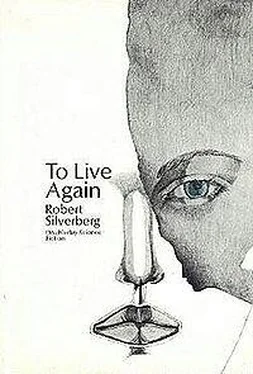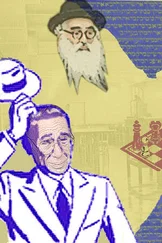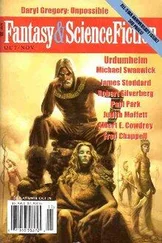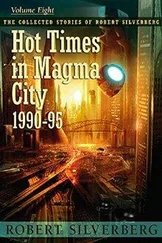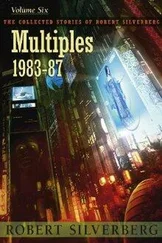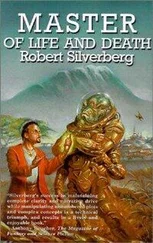He did not know where in the tower Santoliquido had taken him now, whether toward the soaring summit or deep into the bowels. He merely followed, through silent passageways agleam with living light.
The Scheffing Institute was a quasipublic corporation, closely regulated by the Government, its administrators chosen by Congress, its board of directors containing a specified quota of Government appointees. Its schedule of fees and services was subject to Federal supervision. In effect, the Institute was a public utility of death and rebirth. No common stock was available for purchase; its frequently issued debt securities were offered only to municipal and institutional investors; its profits, which were great, went primarily into renewed research, once amortization payments were made. Important as the Institute was, its existence impinged only marginally on the lives of most of Earth’s nine billion people. Merely a minority could afford the costs of escaping oblivion. There was a stiff fee for registration; the fee payable each time one recorded one’s persona was not small; a registrant was expected, though not required, to make a new recording at least once every six months. The cost of receiving a persona transplant was formidable — more than the average man could hope to earn in a lifetime. In theory, anyone who had the money and was certifiably stable could receive a new persona each year of his adult life, superimposed above the earlier ones. But in practice most people were content with two or three transplants, if they could afford that many. No one, to Kaufmann’s knowledge, had ever taken more than nine. Though he could well afford any number of additional identities himself, he had not applied for a new one in more than a decade. He found three quite enough — not counting the youthful indiscretion that had had to be erased.
It was anything but cheap to erase a persona, also. The Institute turned its profit at every stage of the process. Kaufmann followed Santoliquido into the vestibule of the main storage vault. It was a long, low-roofed tunnel whose far end was plugged by a security door almost comical in its paranoid massiveness. Through apertures in the glossy blank roof came colored lights of scanners: a blue ray, a green, a turquoise, a pale yellow.
“What are they checking?” Kaufmann asked. “Everything imaginable. Your blood type’s going on tape, your retinal pattern, your DNA-RNA, and several other matters too intimate to mention. If you ever came through here bent on larceny, you’d be picked up within minutes after you left the building.”
“What if the scanners get through and find I’m too disreputable to admit?”
“It’ll be unpleasant.”
Kaufmann envisioned a cage of pressure tape springing from the ceiling and trapping him. Whirling blades slashing him into hamburger. A trapdoor opening to hurl him to limbo. But in fact the colored lights vanished, and with solemn ponderousness the great door began to open. Santoliquido nodded. They stepped out onto the grand concourse of the main storage vault.
It was a room perhaps a thousand feet high and three hundred feet wide from wall to wall. At the very top, far above his head, Kaufmann saw banks of light-globes affixed to the fabric of the building; but only a fraction of that light made its way down to the midlevel on which they stood, and below him were levels of Stygian bleakness. Motes of dust hovered in the vast central cavity of the room. Along the walls were ladders, catwalks, a spiderweb of metal pathways. Staring across the gulf, Kaufmann made out racks of shelves, paneled urns, shadows in the darkness. All this has been done for effect, he told himself. Surely the Institute could afford better lighting, if it wanted it.
“Come,” said Santoliquido. They moved along the tier. Silent figures in white smocks traversed private paths on other levels, and robots with blunt heads rolled on soundless treads from tier to tier, inserting something here, withdrawing there. Santoliquido paused in front of a sealed bank of urns and dialed a computer code. The bank opened. Reaching in, he withdrew a shining coppery casket some six inches wide, four inches long, two inches high.
“In this,” he said, “is the persona of Paul Kaufmann.” Kaufmann took it from him and examined it with more awe than he cared to reveal.
“May I open it?”
“Go ahead.”
“I don’t see how — ah. There.” He pressed a projecting lever and the casket’s top rose. Within lay a tightly coiled reel of black tape, smaller across than Kaufmann’s palm, and a stack of data flakes. “This?” he said. “This is Uncle Paul?”
“His memories. His experiences. His aggressions. His frailties. The women he loved, the men he hated. His business coups. His childhood ailments. The graduation speech; the cramped muscle; the wedding night. All there. This was recorded in December. It takes him from childhood to the edge of the grave.”
“Suppose I reached over the balcony and hurled all this down there,” Kaufmann said. “The flakes would scatter. The tape would he ruined. That would he the end of Uncle Paul, wouldn’t it?”
“Why do you think so?” Santoliquido asked. “Your uncle was here every six months for more than thirty years. We have many replicas on file of what you hold in your hand.”
Kaufmann gasped. “You keep the old ones after a re-recording?”
“Naturally. We have an extensive library of your uncle’s personae. You have the latest one, the most complete; but if anything happened to it, we could make use of the last but one, which would lack only six months of his life experience. And so on backward. Of course, we always use the most recent recording for transplant purposes. The rest are kept as emergencies, a redundancy control, so to speak.”
“I never knew that!”
“We don’t make a point of announcing it.”
“So you have sixty-odd recordings of Uncle Paul in this building! And a couple of dozen of me! And—”
“Not in this building, necessarily,” said Santoliquido. “We have many storage vaults, Mark, well decentralized. We guard against calamities. We have to.”
Kaufmann considered that. It had never occurred to him that such surrogate recordings existed, or even that there might be supplementary soul banks elsewhere, but both were logical enough. An implication struck him.
“If there are duplicates,” he said slowly, “then it should be possible to transplant one man’s persona into more than one recipient at the same time, yes? You could give Uncle Paul to Roditis, and Uncle Paul minus the last six months to someone else, and so on.”
“Technically possible. But wholly unethical and unlawful. We keep the reserves as reserves. They’ve never been used that way and never will.” Santoliquido looked agitated at the possibility. “Never.”
Kaufmann nodded. The intensity of Santoliquido’s reply unsettled him. He closed the casket and handed it back. “Now do you believe he’s dead?” Santoliquido asked. “Well, of course, I’ve got no evidence that the tape in this box has anything to do with Uncle Paul.”
“Would you like to sample it?”
“Me? Are you proposing a temporary transplant?”
“I’ll give you thirty seconds of Uncle Paul,” Santoliquido offered. “Just as if you were shopping for a new persona. Then you can decide for yourself whether he’s on that tape. Come along. In here.”
They entered a cubicle with dark translucent walls. It contained a reclining seat, a console of equipment, a row of jeweled scanners. Santoliquido removed the tape from the box and clipped it into the grips of one of the scanners. He beckoned Kaufmann to the reclining seat.
They were in a sampling booth now. This apparatus was used strictly for checking and testing. What Kaufmann would experience was not in any way a transplant, not even a temporary; Santoliquido was just going to tune him in on the recorded thought waves of his late uncle and let him swim in them for half a minute.
Читать дальше
